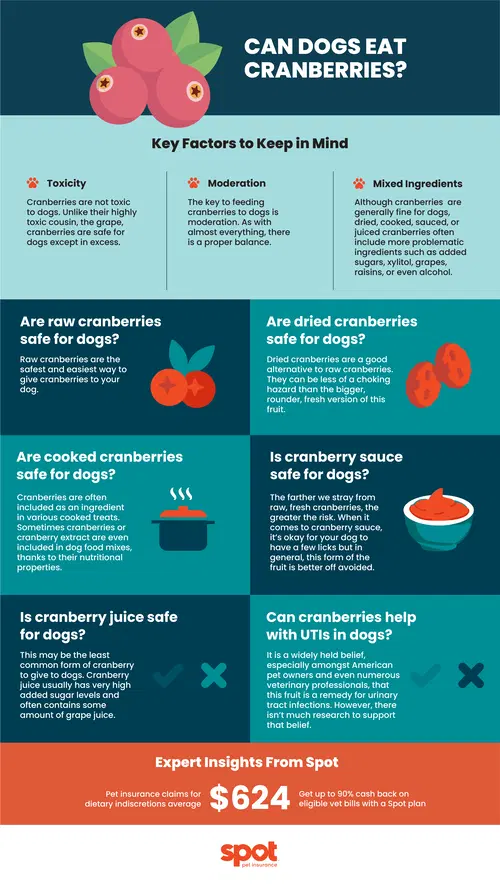Cranberries are a popular seasonal treat and healthy snack for us humans, a trend dating back hundreds of years to early Native American tribes and settlers coming to America from Europe.
Whether you’re indulging in sweet cranberry sauce at Thanksgiving, munching on trail mix with dried cranberries, or enjoying fresh cranberries for extra fiber, you may also be wondering if you can toss one or two to your furry friend.
So can dogs eat cranberries? Yes, but with some caveats. Today, Spot Pet Insurance is here to lay out the details for you so you can confidently cater to your dogs’ wants and needs when it comes to their treats.
We’re talking about the kinds of cranberry snacks can be fitting (or not so fitting) for dogs, as well as common hazards that come with these snacks and alternatives that might be better. We’re also going to touch on common medical questions, such as whether cranberries can be used to treat or prevent UTIs in dogs.

Are Cranberries Safe for Dogs?
Yes, in general, cranberries are a safe snack to give dogs, although there are some key factors to consider.
Toxicity
Cranberries are not toxic to dogs.1 Unlike their highly toxic cousin, the grape, cranberries are generally safe for dogs except in excess.
If your dog eats a handful of cranberries or less, you shouldn't worry much. For smaller pooches an upset stomach or similar issues could occur.
Moderation
With that in mind, the key to feeding cranberries to dogs is moderation. As with almost everything, there is a proper balance.
Too many cranberries can be a problem, but abstinence from cranberries isn’t necessarily the optimal solution either, as this fruit does have numerous health and nutritional benefits.
Some of these positive qualities include antioxidants, which help support your dog’s immune system and combat inflammation, as well as vitamin c, fiber, and potassium.2
Mixed Ingredients
When giving your dog any human food, it’s always important to thoroughly examine every ingredient.
Although cranberries themselves are generally fine for dogs, dried, cooked, sauced, or juiced cranberries often include more problematic ingredients such as added sugars, xylitol, grapes, raisins, or even alcohol.
Knowing what common foods are toxic to dogs is a great foundation. We’re also going to cover cases you should be specifically wary of when it comes to cranberries in more detail below.
Are Raw Cranberries Safe for Dogs?
Raw cranberries are considered the safest and easiest way to give cranberries to your dog.1 One of the main reasons is that raw cranberries are the least likely to be mixed with any problematic ingredients, such as added sugars.
The most important thing to be aware of with fresh cranberries is that they can be a choking hazard. This is especially true if your dog might have problems chewing, a common factor in senior dogs. Small dogs could also struggle to chew and swallow raw cranberries.
You might have to cut up raw cranberries if you are intent on using them as a snack.
Are Dried Cranberries Safe for Dogs?
Dried cranberries are a good alternative to raw cranberries in many cases. They can be less of a choking hazard than the bigger, rounder, fresh version of this fruit, but you need to be aware of what they’re mixed with.
Dried cranberries are most often found in trail mixes, which could also include raisins, which are highly toxic to dogs and must be avoided.
More often than not, dried cranberries, whether part of trail mix or on their own, have added sugars to sweeten them up (since they can be quite tart). Sugar substitutes containing xylitol, which is also very toxic to dogs,3 may also be found, so read labels carefully!
Are Cooked Cranberries Safe for Dogs?
Cranberries are often included as an ingredient in various cooked treats. Sometimes cranberries or cranberry extract are even included in dog food mixes, thanks to their nutritional properties.
As with dried cranberries, you should be wary of what else is part of the recipe, especially when it comes to human foods.
Is Cranberry Sauce Safe for Dogs?
The farther we stray from raw, fresh cranberries, the greater the risk. When it comes to cranberry sauce, it’s okay for your dog to have a few licks if they are cleaning up your Thanksgiving plate, but in general, this form of the fruit is better off avoided.
Primarily this is due to added sugars. Most cranberry sauce includes high amounts of added sugar. Sugary foods may not cause dental problems in dogs as they often do for humans, so your tooth-cleaning worries can rest easy with cranberries, but they can cause gastrointestinal upset, among other nutritional concerns.1
Some recipes for cranberry sauce also involve grapes or alcohol, which are foods to always avoid for dogs.
Is Cranberry Juice Safe for Dogs?
This may be the least common form of cranberry to give to dogs. Cranberry juice usually has very high added sugar levels and often contains some amount of grape juice.
We’ve mentioned grapes a few times, so you may be wondering why they are so toxic to dogs while cranberries are not. Research is ongoing in this area, but the presence of tartaric acid in grapes appears to be the answer.
A little bit of cranberry juice should be okay, but it’s probably easiest to simply avoid it and stick to healthier options.
Can Cranberries Help With UTIs in Dogs?
A common question from pet parents is whether cranberries can help with canine UTIs.
It is a widely held belief, especially amongst American pet owners and even numerous veterinary professionals, that this fruit is a remedy for urinary tract infections. However, there isn’t much research to support that belief.
Cranberries have been used as an herbal remedy for almost every condition you can think of when it comes to humans, although their effectiveness in these areas isn’t confirmed. When it comes to herbal remedies, myth and fact are often blurred, but this is even more true for dogs since there is generally less research than with humans.
Unfortunately, what studies have been conducted regarding the use of cranberries to prevent UTIs vary widely and provide little to no conclusive evidence.1
Higher-quality studies have been conducted in the years since but in sparse supply. What studies have been done have found little or no evidence supporting that cranberries are effective against UTIs.1
Cranberries might have some supplementary benefits in the prevention of urinary tract infections, but they are not an effective replacement for medical treatment.
Should I Feed My Dog Cranberries?
If you’re already munching on cranberries and know there aren’t any toxic ingredients contaminating them, feel free to drop one or two to your dog.
However, allowing this to become your dog’s favorite snack may not be the best idea. Frequent feeding of cranberries or high quantities of this tart treat could be dangerous for your dog.
Of course, many dogs may not even like the taste of cranberries in the first place. Because this snack is very sour, it could be unpleasant for your pup, making your decision even easier.
It may be easiest for some pet owners to avoid berries altogether. There are many fruit alternatives for dogs, including berries, apples (with removed seeds), bananas, blueberries, oranges, pears, pineapples, and watermelon.
Expert Insights From Spot
While sharing our favorite foods with our pets can be tempting, it's crucial to remember that not all human foods are safe for dogs. Spot's internal data reveals that pet insurance claims for dietary indiscretions average $642*, underscoring the need for careful consideration and research before offering snacks to your pet.
Other Fruits That Are Safe To Eat for Your Dog
Papaya isn’t the only fruit with health benefits for your canine companion. If your dog tends to turn up its nose at a treat that’s been offered many times before, or if you simply want to add variety to their diet, you can try these fruits as well:
Remember that grapes and raisins are never fruits you should feed your dog. These have particular enzymes in them that are toxic to dogs—avoid grapes and raisins around your dog like you avoid chocolate! We have compiled a big list of all the fruits your dogs should eat here.

With 15 years as a dog and cat parent, my pet articles are a mix of humor and firsthand experience - proof that the best stories often come with paws and purrs.
*Jan 2019 to Aug 2024 administrator claims data.
“Can Dogs Eat Cranberries?” American Kennel Club, American Kennel Club, 7 Nov. 2022, www.akc.org/expert-advice/nutrition/can-dogs-eat-cranberries/.
"Can Dogs Eat Cranberries?" MasterClass, 24 Mar. 2022, https://www.masterclass.com/articles/can-dogs-eat-cranberries.
“Paws off Xylitol; It’s Dangerous for Dogs.” U.S. Food and Drug Administration, n.d., www.fda.gov/consumers/consumer-updates/paws-xylitol-its-dangerous-dogs.
The information presented in this article is for educational and informational purposes only and does not constitute or substitute for the advice of your veterinarian.











